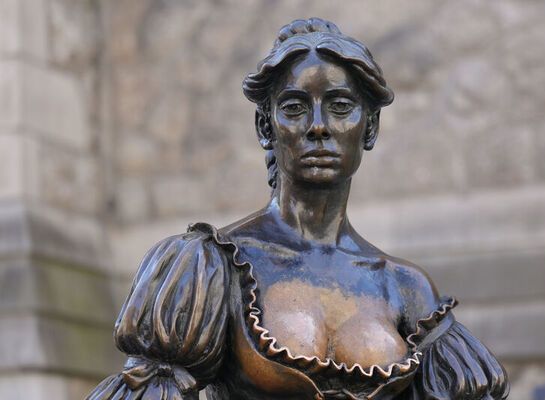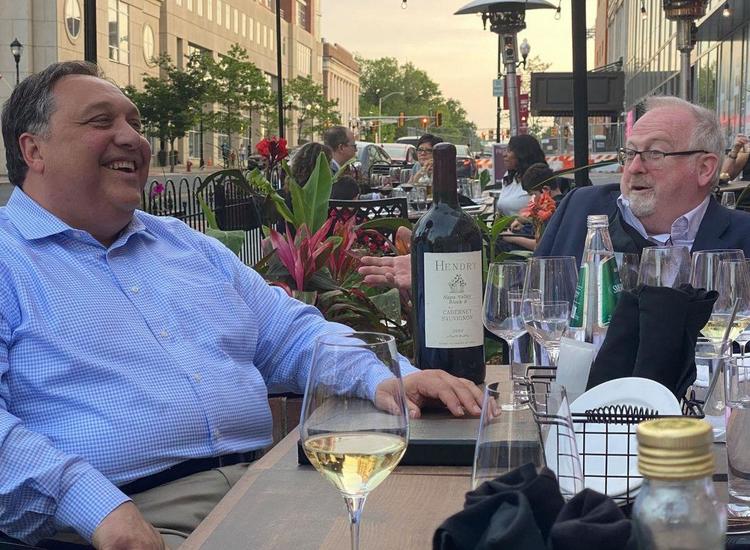[caption id="attachment_75238" align="alignnone" width="600"] IFI-Board
By Ray O'Hanlon
The days surrounding St. Patrick's Day are witness to a large scale movement of Irish politicians, business people and agency chiefs flying westward across the Atlantic with the eastern seaboard of the United States, and the continent beyond it, firmly fixed in their sights.
One among the agency chiefs this past St. Patrick's Day was Dr. Adrian Johnston, chairman of the International Fund for Ireland, the independent organization formed by the Irish and British governments in 1986 and in the aftermath of the Anglo Irish Agreement reached the previous year.
Dr. Johnston (his doctorate is in engineering) was in the nation's capital to report on past progress, present realities and future hopes.
Which is to say that after close to three decades, the IFI is still relevant and still needed, most especially in the six counties of Northern Ireland where the IFI is most active and focused.
"St. Patrick's Day in Washington, D.C. is a great opportunity," Dr. Johnston, who is from Derry, told the Echo in a phone interview.
"It is a chance to meet with members of Congress and senior officials to discuss the progress made over the last twelve months, and also highlight the significant challenges that are still out there," he said.
Johnston's main message during his recent visit focused on current peace building efforts, the challenges to securing a lasting peace, and the importance of continued U.S. support, not just political, but also financial and economic.
Current peace building efforts are most evident in larger cities and towns such as Belfast, Derry, Coleraine, Lurgan, and across the border in Dundalk (the IFI works in six border counties of the Republic as well as the North six).
But it is in Belfast, with its "interfaces" and "peace walls" that much of the current IFI work is concentrated.
"We're very focused on the interfaces and peace walls. We are working on a project of community transformation in those areas," said Johnston, who took up his position as chairman last year.
This has entailed paying particular attention to those who have become disengaged from the peace process, or those who have never engaged in the process of reconciliation to begin with.
"We have a particular focus on young people who might be attracted to paramilitary activity," said Johnston.
Johnston is quick to praise the "valuable support" from the United States over the past 26 years. This support, he said, had been reflected in succeeding presidential administrations and in bipartisan backing for the IFI on Capitol Hill which, in most recent years, has been made manifest in an annual $15 million contribution.
As well as the U.S., the IFI gets backing from the European Union, Canada, Australia and New Zealand. The financial total committed by these backers to date amounts to €890 million, or roughly $1.150 billion.
During the past year, the fund committed £13 million/€16 million to a wide range of what it calls "interventions" in Northern Ireland, and the southern border counties, to promote cross-community and cross-border peace building and reconciliation projects. Case studies of these interventions can be found at www.internationalfundforireland.com.
The IFI board, led by Johnston, is appointed jointly by the British and Irish governments. It is assisted by an advisory committee comprised of senior officials appointed by the two governments. The U.S., EU , Canada, Australia and New Zealand are represented by their international observers at meetings of the board.
According to the IFI, delivering lasting peace on the island of Ireland is a slow process, extending over decades rather than years.
"While enormous progress has been made in recent years, much work is still required to address the sectarian tensions that remain between many Unionists and Nationalists in Northern Ireland," it states.
Meanwhile, the IFI has announced £1.4m/€1.63 million in financial assistance that will, according to a release, support "peace building, integration and reconciliation projects" in Northern Ireland and the southern border counties. The announcement was made following the IFI's Board meeting which took place in the Ballymascanlon House Hotel, Dundalk. The financial commitment includes funds within the IFI's new "Peace Impact Programme" to be shared among four community initiatives, three in Dundalk and one in Derry/Londonderry.








